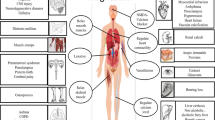Abstract
The effectiveness of DMPS (sodium 2,3-dimercaptopropane-1-sulfonate) in reducing inorganic mercury retention was studied in 2-, 6-, and 28-week-old albino rats. 203Hg was administered IP. The chelating agent DMPS was administered by IP injection at a dose of 250 μmol/kg body weight three times, 1 day after 203Hg administration and at 24 h intervals thereafter. The whole body retention determined 1, 2, 3, and 6 days after 203Hg administration showed that DMPS decreased the body retention of mercury in all age groups, being about twice as effective in adult compared to suckling rats. The reduced effectiveness was due to the reduced efficacy of DMPS in reducing kidney retention in young animals. In other organs the effectiveness of DMPS was not age dependent. These and previous results obtained with different chelating agents and other metals indicate that age might be an important factor in chelation therapy in general.
Similar content being viewed by others
References
Jugo S, Maljković T, Kostial K (1975) The effect of chelating agents on lead excretion in rats in relation to age. Environ Res 10: 271–279
Jugo S (1980) The efficiency of chelating agents in eliminating 203Hg from the bodies of young and adult rats. Health Phys 38: 682–683
Kargačin B, Kostial K, Landeka M (1983) The influence of age on the effectiveness of DTPA in reducing 141Ce retention in rats. Int J Radiat Biol 44: 363–366
Kostial K, Kello D, Jugo S, Rabar I, Maljković T (1978) Influence of age on metal metabolism and toxicity. Environ Health Perspect 25: 81–86
Kostial K, Kargačin B, Blanuša M, Landeka M (1984) Lower efficiency of DTPA in reducing cadmium retention in suckling rats. Environ Res
Kostial K (1983) The absorption of heavy metals by the growing organism: experimental experience with animals. In: Schmidt EHF, Hildebrandt AG (eds) Health evaluation of heavy metals in infant formula and junior food. Springer-Verlag, Berlin Heidelberg, pp 99–104
Planas-Bohne F (1981a) The effect of 2,3-dimercaptopropane-1-sulfonate and dimercaptosuccinic acid on the distribution and excretion of mercuric chloride in rats. Toxicology 19: 275–278
Planas-Bohne F (1981b) The influence of chelating agents on distribution and biotransformation of methylmercuric chloride in rats. J Pharacol Exp Ther 217: 500–504
Thomas DJ, Smith C (1979) Distribution and excretion of mercuric chloride in neonatal rats. Toxicol Appl Pharmacol 48: 43–47
Wachstein M, Bradshaw M (1965) Histochemical localization of enzyme activity in the kidneys of three mammalian species during their postnatal development. J Histochem Cytochem 13: 44–56
Walsh CT (1982) The influence of age on gastrointestinal absorption of mercuric chloride and methyl mercury chloride in the rat. Environ Res 27: 412–420
Author information
Authors and Affiliations
Rights and permissions
About this article
Cite this article
Kostial, K., Kargačin, B., Blanuša, M. et al. The effect of 2,3-dimercaptopropane sodium sulfonate on mercury retention in rats in relation to age. Arch Toxicol 55, 250–252 (1984). https://doi.org/10.1007/BF00341020
Received:
Accepted:
Issue Date:
DOI: https://doi.org/10.1007/BF00341020




